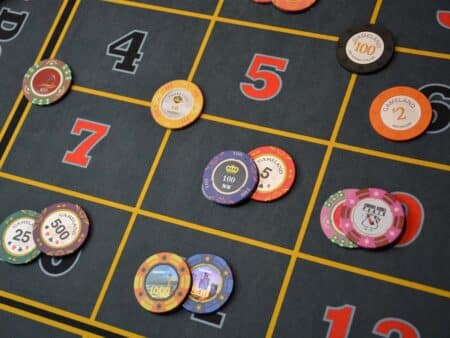Importance of Security Measures in Casinos
Casino security has progressed from traditional physical surveillance to a combination of advanced technology and strategic planning. This change is necessary to outwit casino scammers while protecting the casino’s finances and customers.
Casinos, with their large sums of money, make ideal targets for criminal activity. It is critical to maintain game integrity for reputational and regulatory reasons.
Security measures improve the customer experience by being effective but unobtrusive. A combination of visible deterrents and subtle monitoring is required.


Understanding Casino Security Systems
Systems: “Eye in the sky”
Casino security heavily relies on advanced surveillance systems, known as the “Eye in the Sky.” These systems have a network of high-resolution cameras and sensors to monitor all areas, including the gaming tables and cashier areas.
Trained staff actively watch these feeds, identifying any cheating, theft, or suspicious actions. In addition, many gambling establishments use AI and machine learning software to detect unusual behavior or betting patterns to improve the detection of cheaters in the casino.
Physical Security Measures
While high-tech surveillance is essential, physical measures also have value. Uniformed security personnel are a common sight in gambling establishments, serving as a visible deterrent to potential criminals. These officers are not just for show, they are extensively trained in all aspects of security and emergency response. Their presence reassures both patrons and staff, helping to create a safe and secure gaming environment.
In addition to security personnel, casinos use other physical safeguards such as secure entry points, ID verification systems, and bag searches. These safeguards are intended to prevent unauthorized access and ensure that only eligible patrons enter the gaming area.
Advanced Technologies in Casino Security
Safety in casinos now goes beyond just surveillance cameras, using various advanced technologies. RFID (Radio Frequency Identification) chip tracking helps track chips in real time, preventing theft and counterfeiting. Facial recognition technology helps to identify known fraudsters and blocked persons and also recognizes suspicious behavior. Additionally, biometric systems like fingerprint and retina scanners are being explored to secure high-risk areas and restrict access to authorized personnel only.


Security in Cash Handling
Cash handling procedures are critical, aiming to reduce internal theft while maintaining transaction integrity. This includes:
- Secure Cash Counting Rooms: Cash is processed in rooms equipped with advanced technology, ensuring that transactions are controlled and monitored.
- Segregated Duties: Having multiple employees handle and record cash reduces the risk of embezzlement or misappropriation.
- Checks: Regular audits help to identify and address cash flow discrepancies or irregularities.
- Surveillance Systems: Placed in strategic locations, they deter and monitor potential theft.
- Employees receive comprehensive training in cash handling and the risks of internal theft.
These measures create a secure environment, safeguarding employees and customers while also maintaining trust and integrity in the industry.
The Intricacies of Casino Facility Design
Gambling establishments combine lively entertainment with robust security. Their floor plans are carefully designed for visibility, using surveillance cameras, mirrors, and glass panels to monitor gaming areas, cash zones, and entrances. This minimizes the number of blind spots. Strategic placement of gaming tables and slot machines, along with bright lighting, helps prevent crime. These measures create a favorable environment, protect employees and customers, and maintain trust and integrity in the industry.
In addition, the layout aims to improve customer flow and engagement, creating an immersive gaming atmosphere. This ensures both patron safety and an enjoyable experience. Advanced surveillance, including facial recognition and chip tracking, showcases the industry’s dedication to preventing cheating and fraud, integrating high-tech and traditional methods for comprehensive security.
Collaborative Strategies in Casinos to Prevent Cheating and Fraud
Casinos in the high-stakes gaming world prioritize fairness and integrity. To fight cheaters and fraudsters, they collaborate by sharing information about known cheaters, suspicious activities, and new fraud trends. This cooperation forms a strong defense against illegal gambling.
Gambling establishments work together to build an intelligence network, tracking individuals involved in illegal activities. This improves their ability to anticipate and respond to threats. Industry associations and regulatory bodies enhance this effort by facilitating information sharing, promoting best practices, and setting industry-wide security standards.

Card Counting: Confronting the Challenge of Expert Players
Card counting, a strategy used by some gamblers in games such as blackjack, entails tracking the cards dealt to predict future outcomes. This technique, while not illegal, presents a significant challenge to casinos because it can tip the odds in favor of the player. To combat this, casinos have devised a multifaceted strategy to maintain their advantage and ensure game integrity.
Continuous shuffling machines and multiple decks hinder card counting by constantly mixing cards and complicating tracking. Additionally, frequent deck changes further disrupt counting strategies.
Gambling establishments also use advanced surveillance, like facial recognition, to spot card counters. Dealers are trained to notice signs of counting, such as unusual betting or play patterns, and alert security.
These measures ensure both game integrity and fair play. They protect the casino’s interests and provide a fair gaming experience, preventing the exploitation of the games.
How Employees Track Chips
Casinos have used sophisticated technology to improve security and combat fraud, such as specialized tracking systems in their chips. These chips include unique features such as RFID tags or ultraviolet (UV) markings, allowing you to monitor and verify them in real time.
This advanced system is critical to preventing the use of counterfeit chips and managing their flow. By implementing this chip tracking technology, casinos not only protect their financial interests but also create a safe and trustworthy environment for both customers and employees, significantly reducing the risks associated with counterfeit chips and unauthorized distribution of chips.


Features of Casino Personnel Training
Employees must receive specialized security training in order to detect and respond to any suspicious activity. This training addresses several critical areas:
- Recognizing fraudulent behavior: Employees are trained to recognize signs of fraudulent behavior, such as atypical betting patterns and interactions between players, which aids in the early detection of cheaters.
- Behavior and Body Language Analysis: Staff are trained to examine players’ physical actions and behaviors for signs of cheating or conspiracy.
- Advanced Surveillance Techniques: Employees are trained to use high-tech techniques and tools, such as covert observation and facial recognition systems, to identify and track suspects.
- Teamwork with Security Units: The training highlights the significance of collaborating with security personnel for effective incident management.
- Effective Communication and Incident Reporting: Staff learn the best practices for swiftly and accurately reporting potential security threats.
- Knowledge of Cheating Methods: Employees are informed about common cheating strategies like collusion and chip dumping to prevent fraudulent activities.
This extensive training equips staff with the necessary skills to maintain the integrity of gaming operations and ensure a secure and just environment for patrons.
Final Conclusions
Security is a vital, ever-changing field essential for the success of gaming facilities. It aims to safeguard the casino’s finances, ensure fair play, and provide a safe atmosphere for guests and staff. This involves advanced surveillance like HD cameras and AI software, supported by trained security teams who also handle emergencies and customer service. Gambling establishments integrate technology like RFID chip tracking and facial recognition to prevent fraud and cheating.
This field is evolving, adapting to new threats. For example, cybersecurity has recently become a hot topic in the casino industry and other areas of life. Casinos invest in technology and training, and they work with law enforcement to stay ahead. In the future, this area may include predictive analytics, balancing these with a welcoming environment for patrons.
Violations or deficiencies in the security system can lead to the loss of financial resources for both the casino itself and its customers. This can lead to a conflicting situation. In addition, gambling scandals often attract negative media attention, which can damage the casino’s public image and brand value. This type of publicity can deter new customers and even lead to the loss of loyal customers. In serious cases, scandals can also result in legal consequences and financial penalties, further affecting the profitability and long-term viability of the gambling establishment.









